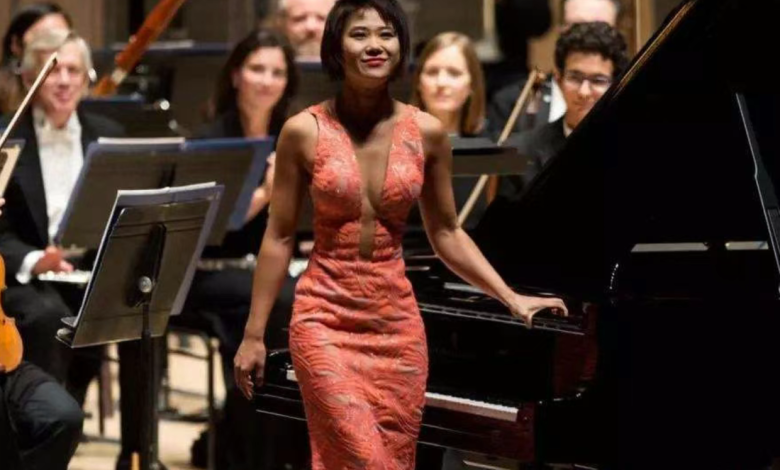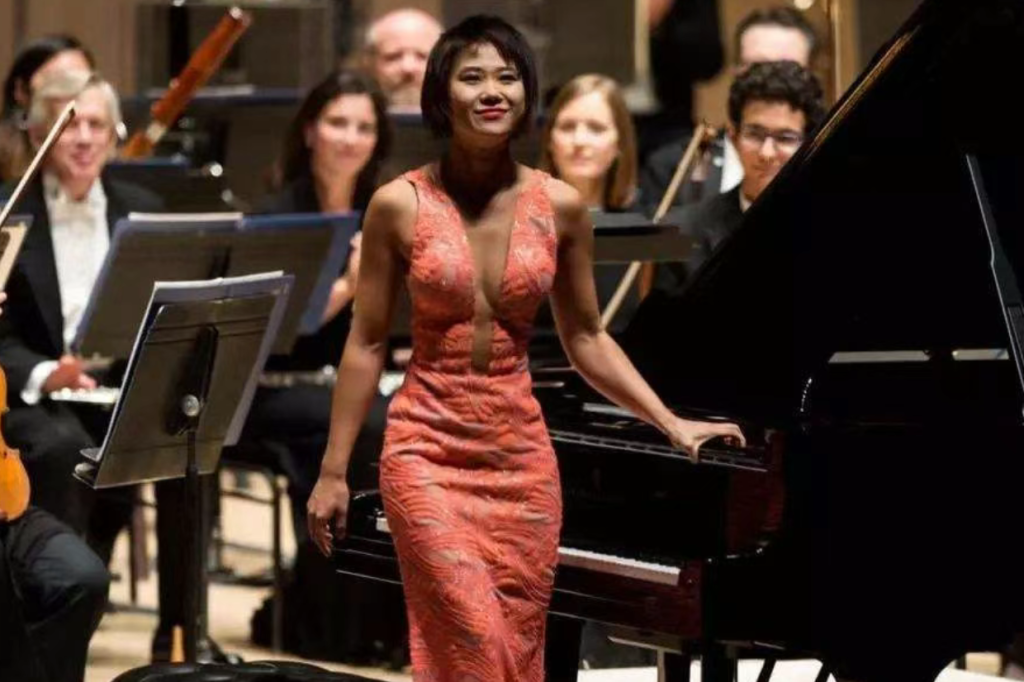
Yuja Wang: The Revolutionary Virtuoso of Modern Classical Piano
Yuja Wang is not just a pianist; she is a phenomenon. With her dazzling technical mastery, fearless artistic choices, and unapologetic individuality, she has redefined what it means to be a classical musician in the 21st century. Born in Beijing in 1987, Wang has risen to become one of the most celebrated and talked-about pianists of her generation.
Her journey—from a child prodigy in China to an international superstar—is marked by relentless dedication, extraordinary talent, and a refusal to conform to traditional expectations. Whether it’s her jaw-dropping performances of Rachmaninoff’s most challenging concertos or her bold, fashion-forward stage outfits, Yuja Wang commands attention.
This article explores her early life, meteoric rise to fame, unique artistic identity, technical brilliance, and the controversies and acclaim that have shaped her career.

Early Life and Musical Beginnings
Child Prodigy in Beijing
Yuja Wang was born on February 10, 1987, in Beijing, China. Her parents—a dancer mother and a percussionist father—recognized her musical talent early. At age six, she began formal piano training at Beijing’s Central Conservatory of Music, where her exceptional abilities quickly became apparent.
By age 12, she had already won national competitions, leading her family to move to Canada so she could study at the Mount Royal Conservatory in Calgary. Her rapid progress caught the attention of renowned pianist Gary Graffman, who invited her to study at Philadelphia’s prestigious Curtis Institute of Music.
Training Under Gary Graffman
Graffman, who also mentored Lang Lang, played a crucial role in shaping Wang’s career. Under his guidance, she refined her technique and developed a deep understanding of Romantic and 20th-century repertoire. Unlike many prodigies who burn out, Wang thrived, absorbing complex works with astonishing speed.
The Breakthrough: A Star is Born
The Fateful Debut
Wang’s big break came in 2005, when she was just 18 years old. Scheduled as a last-minute substitute for Martha Argerich, she performed Beethoven’s Piano Concerto No. 4 with the Boston Symphony Orchestra. Her flawless technique and magnetic stage presence stunned critics, with The Boston Globe declaring her a “once-in-a-generation talent.”
Rapid Ascent to Fame
From that moment, Wang’s career skyrocketed. She signed with Deutsche Grammophon in 2009, releasing critically acclaimed albums featuring works by Chopin, Liszt, and Prokofiev. By her mid-20s, she was performing with the world’s greatest orchestras, including:
- Berlin Philharmonic (under Simon Rattle)
- New York Philharmonic
- Vienna Philharmonic
- London Symphony Orchestra
Her interpretations of Rachmaninoff’s Piano Concerto No. 3 and Tchaikovsky’s Piano Concerto No. 1 became legendary, showcasing her blistering speed, precision, and emotional depth.
Artistry and Technique: Why Yuja Wang Stands Apart
Unmatched Technical Mastery
Wang’s playing is characterized by:
- Lightning-fast fingerwork (evident in pieces like Flight of the Bumblebee and Liszt’s Transcendental Études)
- Dynamic control (from whisper-soft passages to thunderous climaxes)
- Perfect pitch (allowing her to play with extraordinary accuracy)
Her ability to navigate Rachmaninoff’s Third Piano Concerto—one of the most technically demanding works in the repertoire—has solidified her reputation as a modern virtuoso.
A Fresh Approach to Classical Music
Unlike some traditionalists, Wang embraces spontaneity and risk in her performances. She often improvises subtle nuances, making each rendition unique. Critics praise her for:
- Reinventing standard repertoire (e.g., her fiery take on Prokofiev’s Piano Concerto No. 2)
- Championing contemporary composers (like Kapustin and Ligeti)
- Collaborating across genres (jazz, film scores, and even electronic music)
The Fashion Icon: Breaking Classical Music’s Dress Code
Controversial yet Iconic Style
Wang is as famous for her bold fashion choices as she is for her piano playing. She often performs in:
- Body-hugging designer dresses
- Stiletto heels (sometimes as high as 6 inches)
- Daring cuts and vibrant colors
While some purists criticize her outfits as “distracting,” Wang defends her style as an extension of her artistry:
“I dress for the music. If I’m playing Liszt, I want something dramatic. For Mozart, something elegant. It’s about the whole experience.”
A Symbol of Female Empowerment
In a traditionally conservative field, Wang’s unapologetic embrace of femininity and glamour challenges stereotypes. She has been featured in Vogue, Harper’s Bazaar, and The New York Times Style Magazine, bridging the gap between classical music and pop culture.
Personal Life: Privacy Amidst Fame
Is Yuja Wang Married?
Despite public curiosity (“Who is Yuja Wang’s husband?”, “Does Yuja Wang have a boyfriend?”), Wang keeps her personal life private. Unlike her contemporary Lang Lang, who is married to pianist Gina Alice, Wang rarely discusses relationships in interviews.
Balancing Fame and Solitude
Wang admits that touring can be isolating, but she finds solace in:
- Reading philosophy (she admires Nietzsche and Schopenhauer)
- Practicing meditation
- Exploring new cities during tours
Awards and Legacy
Major Accolades
- Gramophone Artist of the Year (2019)
- Echo Klassik Award (2011, 2016)
- Avery Fisher Career Grant (2010)
Influence on the Next Generation
Wang’s success has inspired countless young pianists, especially women, to pursue careers in classical music. Her TED Talk on the future of classical performance emphasized innovation and accessibility, proving that the genre can evolve without losing its soul.
Conclusion: The Unstoppable Force of Yuja Wang
Yuja Wang is more than a pianist—she is a cultural force. By merging technical perfection with artistic rebellion, she has shattered expectations and redefined classical music for a new era. Whether through her dazzling Rachmaninoff interpretations, her bold fashion statements, or her refusal to conform, Wang continues to captivate audiences worldwide.
As she once said:
“Music should be alive, dangerous, unpredictable—just like life.”
And in her hands, it always is.





